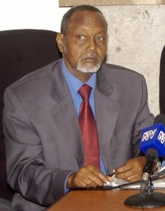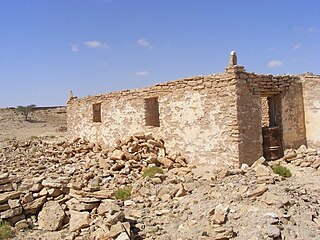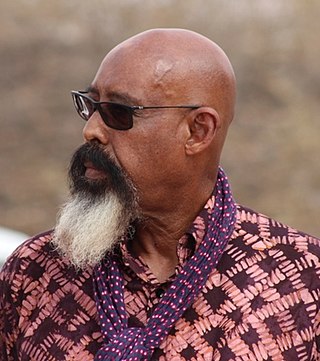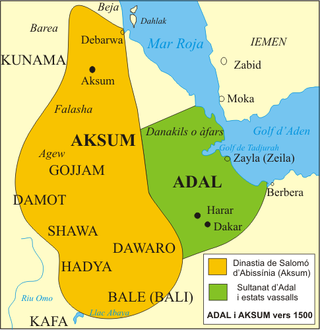Related Research Articles
Somali National University (SNU) is a national university in Mogadishu, the capital of Somalia. Its campus grounds were located four kilometers from the Mogadishu International Airport. It was established in 1971, but was "officially" founded in 1954. It closed in 1990. After closing down for a number of years, the university reopened in August 2014.

The culture of Somalia is an amalgamation of traditions in that were developed independently since the Proto-Somali era. The hypernym of the term Somali from a geopolitical sense is Horner and from an ethnic sense, it is Cushite.

The Isaaq is a major Somali clan family. It is one of the largest Somali clan families in the Horn of Africa, with a large and densely populated traditional territory.

The Rahanweyn, also known as the Digil and Mirifle are a major Somali clan. It is one of the major Somali clans in the Horn of Africa, with a large territory and densely populated fertile valleys of the Jubba and Shebelle rivers and the area between are mainly inhabited by settlers from the Digil and Mirifle lineages.
Muse Sudi Yalahow born Mogadishu was a Trade Minister in the Transitional Government of Ali Mohammed Ghedi. He was dismissed in June 2006 after ignoring government requests to halt fighting with the Islamic Courts Union militia.

Harti, meaning "strong man", is a Somali clan family that is the part of the Darod clan. The major sub-clans include the Majeerteen, Warsangeli, Dishiishe, Dhulbahante and while other minor sub-clans consist of Kaskiqabe, Geesaguule and Liibaangashe.

The Transitional National Government (TNG) was the internationally recognized central government of Somalia from 2000 to 2004.

Asha Haji Elmi is a Somali politician and peace activist. As of August 2012, she is a former member of the Federal Parliament of Somalia.

The transitional federal government (TFG) was the government of Somalia between 2004 and 2012. Established 2004 in Djibouti through various international conferences, it was an attempt to restore national institutions to the country after the 1991 collapse of the Siad Barre government and the ensuing Somali Civil War.

Major General Mohammed Said Hersi Morgan, also known as General Morgan or Colonel Morgan, is a Somali military and faction leader. He was the son-in-law of Siad Barre and Minister of Defence of Somalia. He hails from the Majeerteen Darood clan.
The Somali National Front (SNF) was a politico-military organization that operated in southern Somalia during the Somali Civil War and represented one of the major factions involved in the conflict.
Many factions opposed to Siad Barre set aside tribal and political differences to unite in purpose to overthrow his regime. After the collapse of Siad Barre's government in 1991 the nation fell into a long period of increasingly chaotic conflict between forces of clans, militias, warlords, separatist, religious functions and rebellion movements, other nations, and even the United Nations peacekeepers.

Somali literature is the literature used by the ethnic Somalis of Somalia, Somaliland, Djibouti, Yemen, Eritrea, Ogadenia, and Kenya.

The Bimaal or Bimal, is a sub-clan of the major Dir clan family. This clan is widely known for leading a resistance against the colonials in southern Somalia for decades which can be compared to the war of the Sayyid in Somaliland. The Biimaal mainly lives in southern Somalia, the Somali region of Ethiopia, which their Gaadsen sub-clan mainly inhabits and in the NEP region of Kenya.
Ahmed Abdisalam Adan, also known as Ahmed Mohamed Aden, is a Somali radio journalist, media founder and politician. He is a co-founder of HornAfrik Media Inc based in Mogadishu. In the 2000s, he also served as a Deputy Prime Minister and Minister of Public Security in the former Transitional Federal Government.

Somaliland a self-declared independent country in the Horn of Africa in which inhabitants were initially governed by various kinship networks. Upon contact with Europeans, treaties were signed in the area to secure rights to trade in the territory in exchange for protection of clans from rivals. Britain formally extended a protectorate over British Somaliland in 1898. Inhabitants of Somaliland were British Protected Persons from that date until they gained their independence in 1960 and joined in the union of their state with Italian Somaliland to form the Somali Republic. Inhabitants derive their nationality from Somali law. The legal means to acquire nationality, formal legal membership in a sovereign nation, differ from the domestic relationship of rights and obligations between a citizen within its nation, known as citizenship. Nationality describes the relationship of an individual to the nation under international law, whereas citizenship is the domestic relationship of an individual within the state. As the African Union, United Nations, and no independent nation has recognized its national sovereignty, Somaliland's inhabitants are Somali nationals, but since declaring its independence in 1991, it has de facto authority to control internal affairs and citizenship within its territory.
Reer Faqay, also known as Banu Qahtan, is a Somali clan and a Benadiri sub clan. It is primarily found in the southern coastal cities of Mogadishu, Marka, Baraawe and Kismayo. They established communities in the hinterlands in towns such as Afgooye, Baidoa, Diinsoor and Bardheere.
The Political history of Somalia covers the development of the Somali government and institutional systems following the collapse of the Siad Barre regime in 1991.

The Gadabuursi Ughazate or Ugasate evolved from and was a successor kingdom to the Adal Sultanate and Sultanate of Harar. The first Ughaz (Ugaas) of this successor kingdom, Ali Makail Dera was the son of Makail Dera, the progenitor of the Makayl-Dheere. During the late 19th century, as the region became subject to colonial rule, the Ughaz assumed a more traditional and ceremonial leadership of the clan. The Gadabuursi give their King the title of Ughaz. It's an authentic Somali term for King or Sultan. The Gadabuursi in particular are one of the clans with a long tradition of the institution of Sultan.
References
- ↑ "Somali Women Hope To Affect Khartoum Peace Talks". US Department of State. 2006-10-16. Retrieved 2007-02-08.
- ↑ ""My only clan is womanhood": Building Women's Peace Identities". Women Peacemakers Program . Retrieved 2007-02-08.
- ↑ "SOMALIA: Women demand greater role in new government". IRIN. 2004-11-29. Retrieved 2007-02-08.